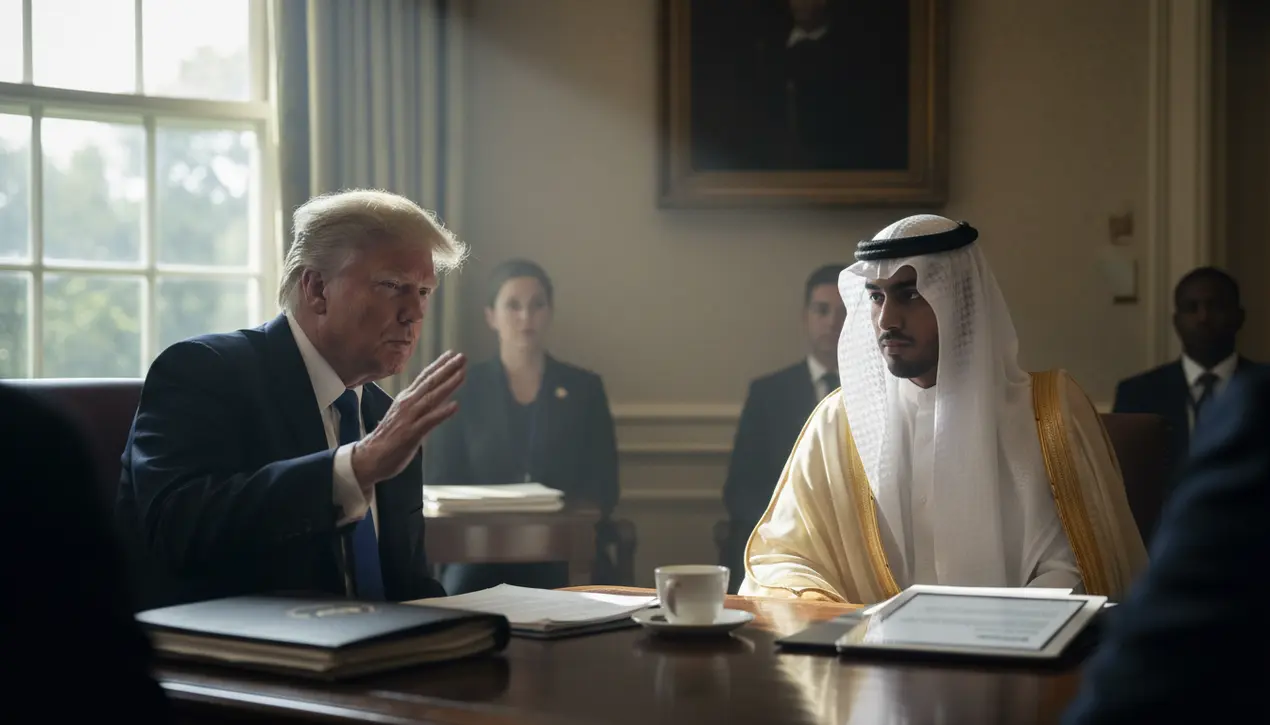
PoliticsdiplomacyBilateral Relations
The US-Saudi relationship is too big to fail…for now
RO
Robert Hayes
2 hours ago7 min read
The most shocking aspect of President Donald Trump’s Oval Office meeting with Saudi Crown Prince Mohammed bin Salman this week was not the content of their exchange, but that it provoked any surprise at all. The session, combative and theatrical, saw Trump blithely dismiss a question regarding the 2018 murder of Washington Post columnist Jamal Khashoggi—an event that US intelligence agencies have concluded was personally ordered by the crown prince.“A lot of people didn't like that gentleman that you're talking about. Whether you like him or didn't like him, things happen, but he knew nothing about it, and we can leave it at that,” Trump remarked, echoing sentiments he expressed in an official 2018 statement that questioned the Crown Prince's involvement while referencing Saudi accusations labeling Khashoggi an “enemy of the state.” This stance is virtually unimaginable for any other US commander-in-chief, not only in its casual disregard for a foreign state’s assassination of a US resident but also in its dismissal of his own intelligence community’s findings. Yet, Trump is hardly the first president across the 80-year arc of US-Saudi relations to subordinate human rights to realpolitik.Consider the precedent set by his predecessor: Joe Biden, who in 2020 vowed to make MBS a “pariah” for Khashoggi’s murder and condemned Saudi actions in Yemen, found himself fist-bumping the crown prince in Riyadh just two years later, compelled by a spike in global oil prices following Russia’s invasion of Ukraine. Prior to the October 7 Hamas attacks, the Biden administration was actively pursuing a historic three-way deal involving a US-Saudi mutual defense treaty, Saudi-Israeli normalization, and progress toward a two-state solution—a framework whose strategic logic has now been inherited, albeit with a far chummier personal dynamic, by the second Trump administration.On Tuesday, Trump mocked Biden’s fist bump, quipping, “I grab that hand. … I don’t give a hell where that hand’s been!” This almost cartoonish bromance, however, obscures the structural limits and enduring tensions that have always characterized this alliance.In fairness, Saudi Arabia has undergone profound societal liberalization since 2018: the religious police have been sidelined, restrictive gender laws lifted, and foreign cultural events permitted. MBS has also curbed earlier destabilizing actions, such as the kidnapping of Lebanon’s prime minister or the blockade of Qatar, while winding down the destructive war in Yemen.Yet, the kingdom remains an absolute dictatorship where political dissent is ruth suppressed and executions of dissidents remain disturbingly common. The warm, if partisan, reception MBS received on Capitol Hill this week—with former critics like Secretary of State Marco Rubio, who once labeled him a “gangster,” now in the room—signals that his pariah status in Washington has unequivocally ended.The meeting yielded tangible outcomes: Saudi Arabia pledged $1 trillion in US investments (though such grandiose promises often prove inflated), committed to purchasing 300 US battle tanks, and secured Trump’s approval for the sale of F-35 fighter jets, despite concerns from US generals about technology sharing with China and from Israel’s supporters about maintaining its qualitative military edge. Trump further announced elevating Saudi Arabia to “major non-NATO ally” status, a designation that facilitates weapons purchases and is notably shared by Israel.Beyond traditional defense and oil, the relationship is expanding into AI and critical minerals, with an investment forum featuring Elon Musk and Nvidia’s Jensen Huang highlighting Saudi ambitions in high-tech sectors. For many in Washington, this multifaceted partnership is simply too big to fail.Yet, strategic divergences persist. Trump desperately wants Saudi Arabia to join the Abraham Accords, a crowning achievement for both his administration and Israeli Prime Minister Benjamin Netanyahu.MBS, however, remained noncommittal, stating, “We want to be part of the Abraham Accords, but we want also to be sure that we secure a clear path to a two-state solution. ” While Palestinian rights may not be a top priority for Riyadh, the kingdom cannot ignore the widespread anger over the war in Gaza if it hopes to lead the Islamic world.Moreover, the US is unlikely to provide the explicit defense guarantees Saudi Arabia seeks, which would require Congressional approval—a significant hurdle. The relationship’s limits were starkly exposed in 2019 when Trump declined to respond forcefully to a massive Iranian missile attack on Saudi oil facilities, a moment of profound frustration for Riyadh.In this volatile region, Saudi Arabia continues to hedge its bets, cultivating closer economic ties with China and signing a recent defense pact with nuclear-armed Pakistan. Thus, while the US and Saudi Arabia still perceive mutual need, the enduring question is not how much Washington can stomach this alliance, but whether Riyadh will continue to tolerate a partnership with a nation as unpredictable as the United States.
#US-Saudi relations
#Donald Trump
#Mohammed bin Salman
#diplomacy
#arms deal
#Khashoggi
#featured
Stay Informed. Act Smarter.
Get weekly highlights, major headlines, and expert insights — then put your knowledge to work in our live prediction markets.
Related News
Comments
Loading comments...
© 2025 Outpoll Service LTD. All rights reserved.